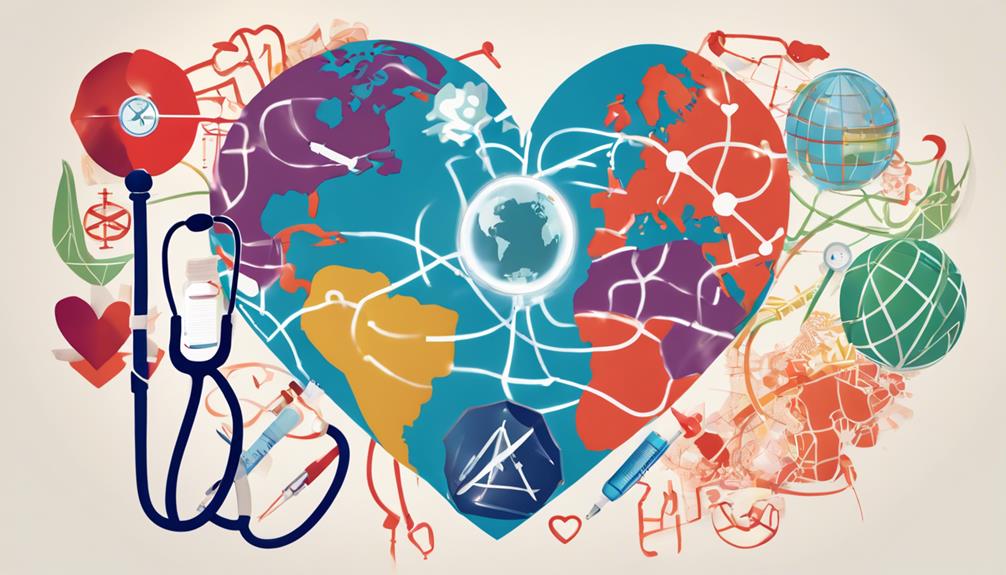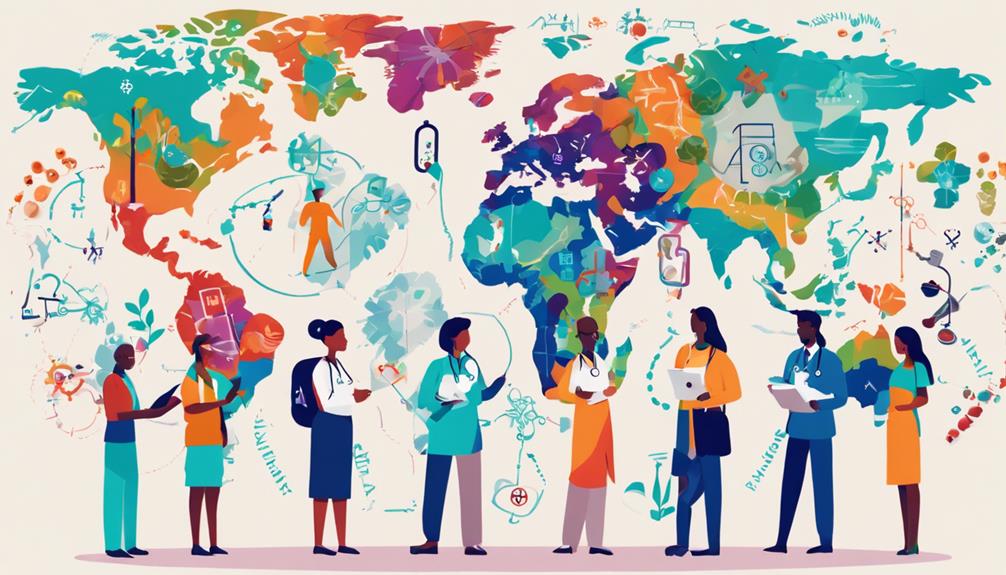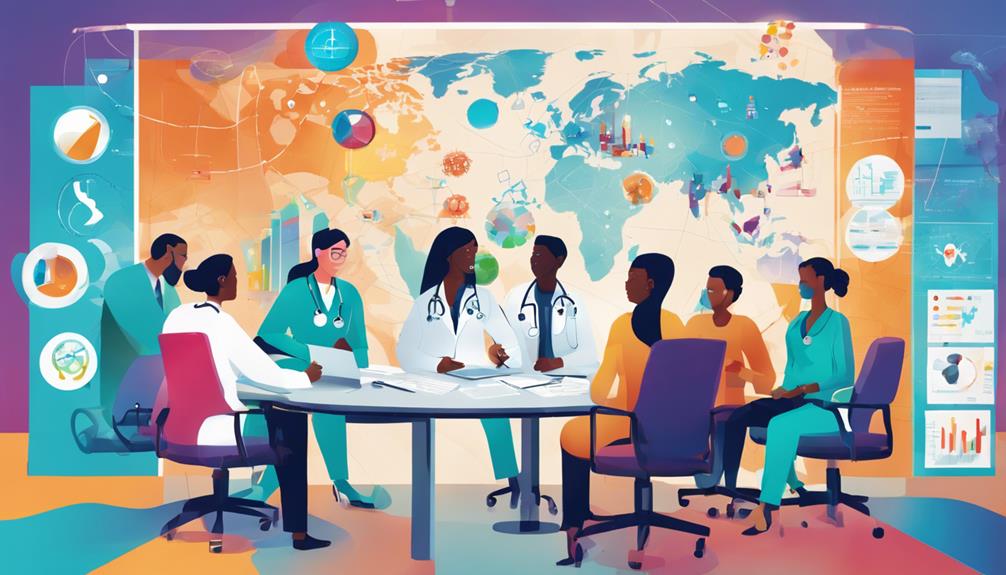The World Health Organization (WHO) is a specialized UN agency aimed at improving global health. You can see its influence through the establishment of health standards and initiatives that promote universal health coverage. Founded in 1948, it focuses on pandemic preparedness, disease eradication, and health equity. WHO coordinates efforts with governments and NGOs, mobilizing resources to tackle diseases like HIV/AIDS and malaria. Achievements include significant vaccination programs and the near elimination of smallpox. However, challenges like funding disparities persist. If you want to explore WHO's objectives and global impact further, there's much more to uncover.
Overview of WHO

The World Health Organization (WHO) is a specialized agency of the United Nations focused on global health, aiming to enhance health outcomes and address health-related challenges worldwide. It plays a pivotal role in coordinating international health efforts, primarily through WHO funding, which is vital for executing projects and initiatives in various countries.Did Jesus Do Yoga
WHO relies heavily on voluntary contributions from member states, international organizations, and private sector entities. This funding is essential for mobilizing resources to tackle pressing health issues such as infectious diseases, maternal and child health, and non-communicable diseases.
Moreover, WHO fosters global partnerships to strengthen health systems. By collaborating with governments, NGOs, and academic institutions, it creates a collective approach to solving complex health problems. These partnerships enhance data sharing, research capabilities, and the implementation of health programs tailored to specific regional needs.
Historical Background
To understand the World Health Organization's impact, you should first look at its formation and objectives, which set the stage for its global health initiatives.
Key milestones highlight the organization's evolution and achievements over the years.
Formation and Objectives
Forming in 1948, the World Health Organization aimed to address global health challenges through coordinated international efforts and the establishment of health standards. You'll find that its primary objectives involve promoting health, preventing diseases, and responding to health emergencies. The WHO emphasizes the importance of healthcare partnerships, recognizing that collaboration among countries is vital for effective health interventions.
The organization fosters research collaborations to enhance knowledge and develop innovative solutions. By engaging with various stakeholders, including governments, non-governmental organizations, and private sector entities, the WHO creates a robust framework that prioritizes health outcomes. These partnerships facilitate the sharing of resources, expertise, and best practices, ultimately leading to improved health systems worldwide.
You should note that the WHO's strategic objectives aren't just limited to disease eradication but also encompass a broader vision of health equity. The organization works tirelessly to guarantee that all individuals have access to essential healthcare services. By focusing on these objectives, the WHO plays a critical role in shaping global health policy and driving progress toward a healthier future for all.
Key Milestones Achieved
Numerous key milestones have marked the World Health Organization's journey, considerably impacting global health initiatives and policy development since its inception.
One significant milestone was the establishment of the Expanded Programme on Immunization in 1974, which laid the groundwork for widespread vaccination campaigns, ultimately saving millions of lives.
In 2000, the WHO set ambitious targets through the Millennium Development Goals, further solidifying its role in global health policy. These goals fostered health partnerships across nations, enhancing collaborative efforts to combat diseases like HIV/AIDS, malaria, and tuberculosis.
Milestone celebrations, such as the 70th anniversary in 2018, highlighted achievements like the eradication of smallpox and the significant reduction of polio cases.
The WHO's Global Health Initiative launched in 2002 exemplifies its commitment to addressing health challenges through strategic partnerships, emphasizing the importance of collaborative efforts in health systems strengthening.
As you analyze these milestones, you'll recognize how they've shaped current health policies and practices, emphasizing the WHO's critical role in driving global health forward. Each achievement builds upon the last, reinforcing the organization's mission to guarantee health for all.
Global Impact Overview
The World Health Organization has greatly influenced global health policies and practices since its establishment, shaping responses to health crises and improving health outcomes worldwide. Through its initiatives, it has identified and tackled health disparities that affect vulnerable populations, ensuring equitable access to healthcare. For instance, the WHO's Global Health Observatory provides data that drives policies aimed at reducing these inequalities.
International collaboration has been at the heart of the WHO's efforts, bringing together member states, NGOs, and other stakeholders. By facilitating partnerships, the organization has effectively mobilized resources and expertise to combat diseases like HIV/AIDS, malaria, and tuberculosis. Recent efforts during the COVID-19 pandemic highlighted the critical role of coordinated global responses in mitigating health threats.
As you analyze the WHO's impact, consider how its strategic frameworks, such as the Global Action Plan for Healthy Lives and Well-being for All, promote sustainable health improvements. The emphasis on data-driven decision-making enables countries to develop tailored health strategies, ultimately enhancing global health security.
Key Objectives and Goals

One of WHO's primary objectives is to guarantee universal health coverage, enabling access to essential health services for everyone, everywhere. Achieving health equity is central to this mission, ensuring that marginalized populations receive the care they need without financial hardship. WHO focuses on eliminating disparities in health outcomes, aiming for a world where access to healthcare is a right, not a privilege.
Another critical goal is enhancing pandemic preparedness. With lessons learned from past health crises, WHO emphasizes the importance of robust surveillance systems, rapid response mechanisms, and international collaboration. By investing in prevention and preparedness strategies, WHO aims to mitigate the impact of future pandemics on global health.
Moreover, WHO supports member states in strengthening their health systems, promoting research, and fostering innovation. By prioritizing health equity and pandemic preparedness, you're not just addressing immediate health concerns; you're also laying the groundwork for sustainable health improvements.
These objectives represent a proactive approach, ensuring that health systems can withstand challenges and respond effectively when crises arise. Ultimately, these goals reflect WHO's commitment to safeguarding health for all, contributing to a healthier, more resilient global community.
Major Achievements
The WHO has markedly advanced global health through initiatives like widespread vaccination programs, which have saved millions of lives.
Its disease eradication efforts, particularly against polio and smallpox, showcase its impact on public health.
Additionally, the organization plays a vital role in shaping effective health policies that guide nations in improving healthcare systems.
Global Vaccination Initiatives
Global vaccination initiatives have notably reduced the incidence of preventable diseases, saving millions of lives worldwide. Since the introduction of the Expanded Programme on Immunization in 1974, vaccination coverage has increased appreciably, with global coverage for routine vaccines reaching 86% in recent years. This progress is particularly evident in the fight against diseases like measles and polio, which have seen dramatic declines in cases.
However, challenges such as vaccine hesitancy persist. Awareness campaigns are essential for addressing misconceptions and misinformation that fuel hesitancy. By promoting accurate information and engaging communities, organizations are working to rebuild trust in vaccines.
Equitable access remains another vital focus. Efforts like Gavi, the Vaccine Alliance, have been instrumental in ensuring that low- and middle-income countries receive vaccines at affordable prices. Their support has enabled countries to immunize vulnerable populations, contributing to the global goal of universal health coverage.
Disease Eradication Efforts
Significant advancements in disease eradication efforts have led to the near elimination of smallpox and a dramatic reduction in polio cases worldwide. These achievements stem from effective eradication strategies that prioritize vaccination and thorough disease surveillance.
The World Health Organization (WHO) implemented a global smallpox eradication campaign that utilized targeted vaccination and robust data collection, culminating in the disease's eradication in 1980.
For polio, improved disease surveillance systems have been essential in tracking outbreaks and mobilizing resources efficiently. As a result, the global incidence of polio has decreased by over 99% since the late 1980s, with only a handful of countries still reporting cases. By leveraging innovative strategies, such as the use of oral polio vaccines and community engagement, WHO has made significant strides toward complete eradication.
Additionally, the lessons learned from these campaigns inform ongoing efforts against other infectious diseases, including Guinea worm disease and malaria. By continually refining eradication strategies and enhancing disease surveillance, we can contribute to a future where these diseases are no longer a public health threat.
The path forward relies on data-driven decisions and global collaboration.
Health Policy Development
Building on the success of disease eradication efforts, health policy development has played a pivotal role in shaping effective responses to public health challenges worldwide. You'll see that major achievements in this area focus on creating robust policy frameworks that promote health equity. For instance, the WHO's Global Action Plan for the Prevention and Control of Noncommunicable Diseases has set a clear agenda for countries to prioritize health-related policies.
By analyzing data on health disparities, you can identify gaps in access and outcomes, enabling targeted interventions. The introduction of universal health coverage policies has been instrumental in ensuring that marginalized populations receive necessary health services. In addition, the integration of health equity into national policies has led to significant improvements in health outcomes across various demographics.
You'll also observe how collaborative frameworks, such as the Health in All Policies approach, allow sectors beyond health to contribute to well-being. These developments not only enhance the effectiveness of health systems but also foster a more equitable distribution of resources.
Global Health Initiatives

Numerous health initiatives launched by the World Health Organization aim to address pressing global health challenges and improve health outcomes worldwide. These initiatives focus on promoting health equity, guaranteeing that all individuals, regardless of their socio-economic status, have access to essential health services. For instance, the WHO's Universal Health Coverage initiative advocates for policies that enhance healthcare accessibility and affordability, especially in underserved populations.
Community engagement plays a vital role in these initiatives. By involving local communities in decision-making processes, the WHO empowers individuals to take charge of their health and tailor interventions to meet their specific needs. This approach has demonstrated significant success in initiatives like the Global Vaccine Action Plan, where local participation increased immunization rates in various regions.
Moreover, data-driven strategies are fundamental for evaluating the effectiveness of these initiatives. The WHO regularly collects and analyzes health data to identify gaps and monitor progress. This evidence-based approach not only informs policy adjustments but also guarantees accountability in achieving health targets.
Ultimately, the WHO's global health initiatives aim to create a healthier, more equitable world through collaborative efforts and informed decision-making.
Current Challenges
Despite the progress made through various health initiatives, the World Health Organization faces several current challenges that hinder its mission to improve global health outcomes. One major issue is funding disparities among member states, which lead to unequal resource allocation and limit the organization's ability to respond effectively to health crises. In 2022, the WHO reported that only 25% of its planned budget was funded, greatly affecting its operational capabilities.
Another pressing challenge is pandemic preparedness. The COVID-19 pandemic exposed considerable gaps in global readiness, revealing that many countries lacked the necessary infrastructure and systems to respond swiftly. As nations recover from the pandemic, the WHO emphasizes the need for extensive strategies to enhance surveillance, rapid response, and vaccine distribution.
To strengthen pandemic preparedness, the WHO advocates for increased investment in health systems, particularly in low- and middle-income countries. Without addressing these funding disparities and enhancing pandemic preparedness, the WHO's mission to guarantee health for all remains at risk.
Addressing these challenges is vital for fostering a resilient global health landscape that can effectively tackle future health threats.
Future Directions

To effectively navigate the complexities of global health in the coming years, the World Health Organization must prioritize innovative strategies that enhance collaboration and resource sharing among member states.
As you look ahead, it's essential to leverage digital health technologies to improve health delivery systems. These technologies can streamline communication, facilitate data sharing, and enable real-time responses to health crises, ultimately increasing efficiency.
Moreover, you need to focus on health equity, guaranteeing that marginalized populations gain access to essential health services. By adopting a thorough approach that balances technological advancements with equitable resource distribution, you'll foster an inclusive global health ecosystem.
Partnerships with private sector entities can further amplify these efforts, creating a network that supports both innovation and equitable access.
Data-driven initiatives should guide your strategies, helping to identify gaps in health services and target interventions effectively. Regular assessments will confirm that progress is measurable and aligned with the evolving needs of diverse communities.
Conclusion
In conclusion, the World Health Organization plays an essential role in shaping global health policies and addressing health challenges.
With its rich history and clear objectives, it has achieved significant milestones through various initiatives.
However, it faces ongoing challenges, including pandemics and health inequities.
As you look ahead, it's important to support WHO's efforts and adapt to emerging health trends, ensuring a healthier future for all.
Your engagement and awareness can make a difference in these global initiatives.
